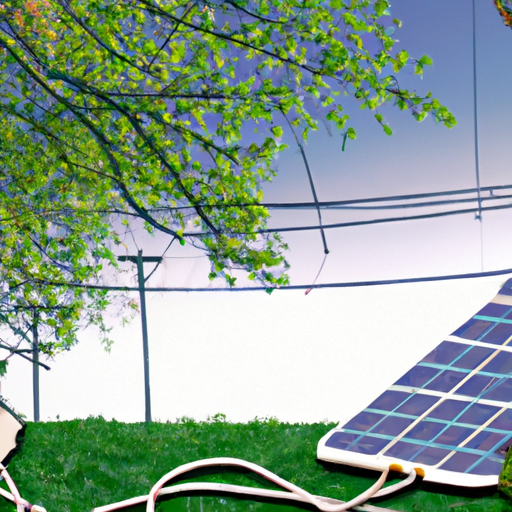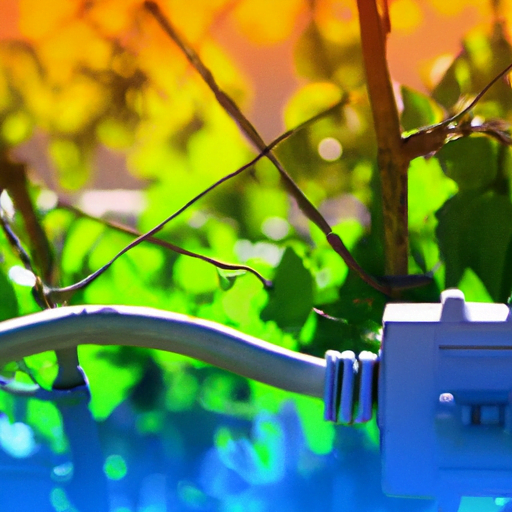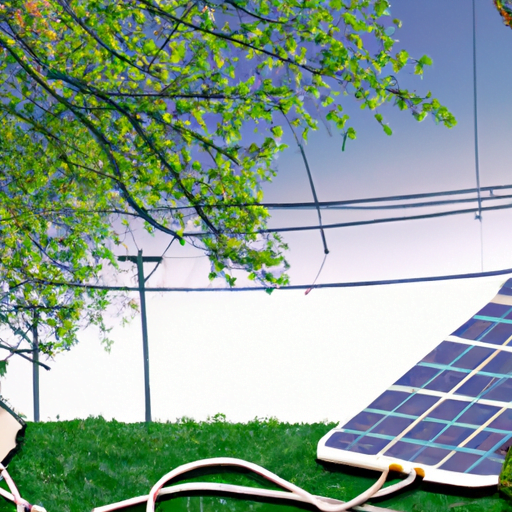Are you tired of the constant reliance on technology and the grid? Are you curious about the idea of living off-grid? Well, let me tell you, you’re not alone in this pondering. Many people are starting to question whether going off-grid is a better choice for a more sustainable and fulfilling lifestyle. In this article, we’ll delve deeper into the topic and explore the advantages and challenges of living off-grid.
Living off-grid means disconnecting from the traditional power grid and relying on alternative sources of energy, such as solar or wind power. It also involves finding ways to be self-sufficient and reducing our overall environmental impact. Going off-grid can provide a sense of freedom and independence, allowing you to live in closer harmony with nature and reduce your carbon footprint. But, it also comes with its own set of challenges, such as the initial cost of setting up an off-grid system and the need for skill-building in various areas, like growing your own food or learning to fix things yourself.
So, is going off-grid the better choice for you? Well, that’s something you’ll have to decide based on your own values, goals, and circumstances. In the upcoming article, we’ll discuss the advantages of living off-grid in more detail, including the potential cost savings, increased self-sufficiency, and the opportunity for a simpler, more connected lifestyle. We’ll also explore some of the challenges you may face and offer tips to help you make the transition if you decide it’s the right path for you. Stay tuned!

Living off grid
In today’s modern world, living off grid is becoming an increasingly popular lifestyle choice. Many people are seeking a simpler way of living, free from the constraints of the traditional power grid and the consumerist culture that often accompanies it. But is going off-grid really the better choice? Let’s explore the benefits and challenges of living off grid to help you make an informed decision.
Benefits of living off grid
One of the key benefits of living off grid is the ability to reduce your carbon footprint. By generating your own renewable energy, such as solar or wind power, you can significantly decrease your reliance on fossil fuels. This not only helps combat climate change, but it also reduces air pollution and improves the overall quality of the environment. You have the power to be part of the solution, taking action to preserve natural resources for future generations.
Living off grid also offers a sense of energy independence. You are no longer at the mercy of utility companies and their fluctuating prices. Instead, you can generate your own power and become self-sufficient. This not only provides a sense of empowerment, but it also protects you from rising energy costs in the long run. Investing in renewable energy systems may require an initial upfront cost, but the long-term savings can be significant.
Moreover, choosing to live off grid promotes sustainability. By embracing a self-sufficient lifestyle, you are reducing your ecological footprint. You become more mindful of the resources you consume and are better able to make conscious choices that minimize waste. Living off grid encourages a simpler way of life, where you prioritize what is truly necessary and eliminate unnecessary material possessions.
Challenges of living off grid
While the benefits of living off grid are enticing, it is important to consider the challenges that come along with this lifestyle choice. One of the main challenges is the initial investment required to set up an off-grid system. Purchasing solar panels, wind turbines, and other necessary equipment can be costly. However, it is important to remember that these costs can often be recouped over time through long-term energy savings. It is a matter of balancing the upfront costs with the potential long-term benefits.
Additionally, living off grid may require lifestyle adjustments. You need to be more conscious of your energy usage and make sure not to exceed the capacity of your renewable energy systems. This may mean being mindful about using high-energy appliances and making energy-efficient choices. It may also require additional labor and maintenance to ensure that your renewable energy systems are functioning optimally. Living off grid can be a rewarding experience, but it does require dedication and effort.
Environmental impact
One of the major motivations for living off grid is the desire to reduce one’s environmental impact. By going off grid, you can take significant steps towards reducing your carbon footprint and preserving natural resources.
Reducing carbon footprint
By generating your own renewable energy, you are no longer relying on fossil fuels that contribute to greenhouse gas emissions. Traditional power grids rely heavily on fossil fuels such as coal and natural gas, which release harmful carbon dioxide into the atmosphere. By using renewable energy sources such as solar or wind power, you are effectively reducing your contribution to climate change. This is a positive step towards a more sustainable future.
Preserving natural resources
Another major benefit of going off grid is the ability to preserve natural resources. Traditional power grids require vast amounts of water for cooling purposes, often leading to water scarcity in areas with high energy demand. By generating your own power, you are reducing the strain on water resources. Additionally, the extraction of fossil fuels can have detrimental effects on ecosystems, including habitat destruction and water pollution. By reducing your reliance on fossil fuels, you are helping to protect these precious natural resources.
Energy independence
One of the most empowering aspects of living off grid is the ability to become energy independent. By generating your own power, you are no longer at the mercy of utility companies and the rising costs of electricity.
Generating renewable energy
Living off grid allows you the opportunity to generate your own renewable energy. Solar panels and wind turbines are common options for off-grid energy production. Solar panels harness the power of the sun to generate electricity, while wind turbines convert the kinetic energy of the wind into usable energy. These renewable energy sources are abundant and can provide a reliable source of power if properly harnessed.
Reducing reliance on fossil fuels
By generating your own renewable energy, you are decreasing your reliance on finite fossil fuels. Traditional power grids are heavily dependent on fossil fuels, which are not only depleting but also contribute to air pollution and climate change. By going off grid, you are taking a stand against this reliance and embracing a more sustainable and environmentally friendly way of living.

Sustainability
Living off grid promotes sustainability by encouraging self-sufficiency and reducing waste.
Promoting self-sufficiency
Living off grid requires a level of self-sufficiency. You are responsible for generating your own power, managing your water supply, and potentially growing your own food. This promotes a greater sense of self-reliance and encourages you to be more mindful of the resources you consume. By becoming more self-sufficient, you can reduce your environmental impact and live a more sustainable lifestyle.
Creating a smaller ecological footprint
Living off grid inherently leads to a smaller ecological footprint. By prioritizing what is truly necessary and eliminating unnecessary material possessions, you are reducing waste and minimizing your impact on the environment. This can include making conscious choices about the products you buy, reducing your water usage, and embracing a simpler way of life. By living off grid, you are actively contributing to the preservation of the environment and the sustainability of our planet.
Financial considerations
While living off grid can have long-term cost savings, there are initial financial considerations to take into account.
Initial investment
Setting up an off-grid system can require a significant initial investment. The cost of solar panels, wind turbines, and other necessary equipment can add up. However, it is important to consider this as a long-term investment. Over time, the savings on energy costs can offset the initial financial outlay. Additionally, there are often government incentives and tax credits available for those who choose to invest in renewable energy systems. It is important to research and explore these options to make the most financially sound decision.
Long-term cost savings
Living off grid can result in significant long-term cost savings. By generating your own renewable energy, you can eliminate or greatly reduce your monthly electricity bills. Additionally, by being mindful of your energy usage and making energy-efficient choices, you can further reduce your overall energy consumption. Over time, these cost savings can add up and make a noticeable difference in your financial situation.
Technological advancements
Advancements in off-grid systems and smart home integration have made it easier than ever to live off grid.
Off-grid systems and innovations
Off-grid systems have made significant advancements in recent years. Solar panels and wind turbines are more efficient and affordable than ever before. Battery storage technologies, such as lithium-ion batteries, are also improving, allowing for a more reliable and consistent power supply. These technological advancements make it easier to generate and store renewable energy, making off-grid living a more feasible and practical option for many.
Smart home integration
Smart home technologies have also made their way into the off-grid living landscape. These technologies allow for better control and monitoring of your energy consumption. Smart thermostats, for example, can help optimize your heating and cooling usage, leading to energy savings. Additionally, smart home energy management systems can track the energy generated and used in real-time, allowing you to make data-driven decisions to further reduce your energy consumption. Integration of these technologies can enhance the off-grid living experience and provide greater convenience and control.
Social aspects
Living off grid can have positive social impacts, including community building and reducing consumerism.
Community building
Living off grid often leads to a stronger sense of community. Off-grid communities often share resources, knowledge, and skills, fostering a supportive and collaborative environment. There is a sense of shared values and a common goal of living sustainably and self-sufficiently. This community building aspect can be immensely rewarding, providing a support network and a sense of belonging.
Reducing consumerism
Living off grid inherently encourages a reduction in consumerism. By embracing a simpler way of life and prioritizing what is truly necessary, you can break free from the consumerist culture that often dominates modern society. Instead of constantly buying and accumulating possessions, off-grid living promotes a more mindful and deliberate approach to consumption. This can lead to greater satisfaction and happiness with less materialistic pursuits.
Health and well-being
In addition to the environmental and financial benefits, living off grid can also have positive impacts on your health and well-being.
Connection with nature
Living off grid allows you to be closer to nature. Surrounded by the great outdoors, you have the opportunity to immerse yourself in natural beauty and reap the benefits of being in a peaceful and serene environment. Access to nature has been shown to have numerous physical and mental health benefits, including stress reduction, improved mood, and increased physical activity. By choosing an off-grid lifestyle, you can prioritize your connection with nature and reap the rewards it brings.
Improved air and water quality
Off-grid living can lead to improved air and water quality. By relying on renewable energy sources, you are reducing harmful emissions that contribute to air pollution. Additionally, by managing your own water supply, you have control over the quality and purity of the water you consume. This can help ensure that you and your family have access to clean and safe drinking water, free from contaminants that may be present in centralized water systems.
Government regulations
When considering going off grid, it is important to be aware of any government regulations and restrictions that may apply.
Permits and restrictions
Some areas may require permits or have zoning restrictions in place for off-grid living. These regulations are meant to ensure safety and compliance with local laws. It is important to research and be aware of any applicable permits or restrictions before embarking on an off-grid lifestyle. Consulting with local authorities or a professional in the field can help ensure that you are in compliance with all necessary regulations.
Zoning and land use
Zoning regulations may also impact your ability to live off grid. Different areas have different zoning designations, which dictate how land can be used. Some areas may have restrictions on whether or not residential properties can be completely off grid. It is important to research the zoning regulations in your desired location to ensure that living off grid is allowed and that you are in compliance with all relevant laws.
Conclusion
In conclusion, going off grid can be a transformative and rewarding lifestyle choice. By reducing your carbon footprint, promoting sustainability, and gaining energy independence, you can have a positive impact on the environment and your own well-being. However, it is important to weigh the pros and cons and consider your own personal circumstances and preferences. Living off grid requires commitment, effort, and initial financial investment, but the long-term benefits can be significant. If you are ready to prioritize self-sufficiency, sustainability, and a closer connection with nature, going off grid may indeed be the better choice for you.




